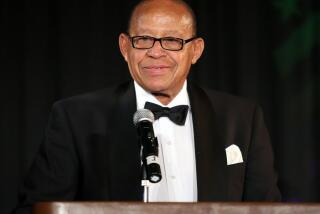David S. Broder dies at 81; Pulitzer Prize-winning columnist
Reporting from Washington -- â David S. Broder, one of the nationâs leading political reporters and a Pulitzer Prize winner in 1973 for distinguished commentary about the Watergate scandal, has died. He was 81.
Broder, a longtime columnist at the Washington Post, died Wednesday at Capital Hospice in Arlington, Va., from complications of diabetes.
In a statement, President Obama described Broder as âthe most respected and incisive political commentator of his generation.â
Broder, who continued to write his column despite failing health, served as a mentor to countless colleagues. His professorial mien helped earn him the unofficial title of dean of the political press corps, and he gained considerable fame for his work as reporter, syndicated columnist and public affairs show guest â including a record 401 appearances on NBCâs âMeet the Press,â starting in 1963.
But it was his humility and humanity that stood out. âAs good a journalist as David Broder is, heâs a better human being,â Lou Cannon, a former Post colleague, once said.
Gracious and unpretentious, âDave set the standard for what political reporting was in this country,â said Dan Balz, a longtime Post colleague. âAnd as important as that was, he was also a role model for so many people and generous to younger reporters who were new to the beatâ â including those from competing organizations.
Broder held himself to standards and techniques he urged on others, such as the importance of walking precincts and knocking on doors to learn what was on the electorateâs mind. His opening gambit when interviewing strangers at campaign rallies was disarmingly simple: âExcuse me, are you a registered voter?â
In seeking out political scientists and giving their views wider circulation, he influenced other journalists to do the same. That trend was not universally admired by contemporaries like veteran Washington journalist Jack W. Germond, who thought politics couldnât be reduced to a science but admitted Broder âwas tough about his fondness for political scientists. He couldnât be shamed out of it.â
As politics grew more polarized in recent years, it became fashionable to disdain Broderâs centrist instincts and wariness of extreme political outsiders, leading some to describe him as a promoter of conventional wisdom and an example of what was wrong with Washington.
Leonard Downie Jr., who worked with Broder as the Postâs national editor, managing editor and executive editor, called that criticism âhorribly unfair. All you have to do is read his columns and his books to see that he was long a critic of what was going on in Washington and politics.â
Broder wrote or co-wrote seven books, including âDemocracy Derailed â (2000), which described the mix of big money and statewide ballot initiatives in California and elsewhere as âalien to the spirit of the Constitutionâ because it enhanced the power of wealthy special interests.
A tireless worker who always found time for the latest baseball news, Broder recently compared Obamaâs difficulty in carving out a U.S. role in Egypt to the plight that fans of his favorite clubs â the âlucklessâ Chicago Cubs and âhapless Washington Nationalsâ â face each fall when other teams battle it out for the World Series. âYou know that something big is happening and that it will inevitably affect you,â he wrote. âBut you donât know whom to root for.â
Born Sept. 11, 1929, in Chicago Heights, Ill., where his father was a dentist, David Salzer Broder entered the University of Chicago at 15 and received bachelorâs and masterâs degrees there. After service in the Army, he began his newspaper career at the Bloomington, Ill., Pantagraph. He was hired as a reporter in 1955 by Congressional Quarterly in Washington and later by the Washington Star. In 1965, he joined the New York Times but left after less than two years, turned off by constant squabbles between the paperâs editors in New York and Washington.
When he joined the Washington Post in 1966, he became âthe first top-rank reporter ever to quit the Times for the Post,â legendary Post Editor Benjamin Bradlee wrote in a 1995 memoir. âI romanced him like heâs never been romanced â in coffee shops, not fancy French restaurants, because Broder was a coffee-shop kind of man: straightforward, no frills, all business.â
Broder is survived by his wife of 59 years, Ann, their four sons and seven grandchildren. He lived in Arlington, Va., and had a summer cabin on Beaver Island in Lake Michigan.
More to Read
Sign up for Essential California
The most important California stories and recommendations in your inbox every morning.
You may occasionally receive promotional content from the Los Angeles Times.










